


















WhenwesayPARClifeisyourbestlife,wedon’texpectyoutotakeourwordforit. Instead,wewantyoutotryitforyourself!
PARCexperiencestaysallowseniorstosampleallthecomfortsofourlifestyleandsuites–withnocostorcommitment.Comeandgazeatourbeautifulviews,tasteourflavour-packed, chef-madecuisineandexperiencethefreedomofhavingyoureveryneedtakencareof. You’llfeelathomefromthemomentyouwalkthroughourdoors.
Yourexperiencestaycomespackagedwithourexclusive PARCActiveLiving™programincludingfitnessclasses,art andculturalprograms,complimentarytransportationand more.Andunlikeexperiencestaysofferedatotherseniorliving communities,the PARCExperienceisimmersive,lasting uptotwoweeks.






CONTRIBUTING EDITOR
Ben Bengston SALES DIRECTORS
Michelle Bhatti, Manny Kang SALES
Wali Adel, Tammy Berry, David Chiew, Alison Clay, Brenda Coulbourn, Nayeli Garcia, Jasmine Goode, Arlene Grant, Eli Laycock, Nathalie Longo, Collin Neal, Randy Sangha, Sanjay Sharma
GRAPHIC
Birgit Brunner
GENERAL MANAGER
Matt Blair
mblair@lodestarmedia.ca







It’s not the kind of ride that anyone exactly wants to be going on, but it’s often precisely the kind of ride that’s needed.
Since 2016, hundreds of volunteer drivers have travelled millions of kilometres there and back again for the Volunteer Cancer Drivers Society, a non-profit organization that provides complimentary transportation services for Metro Vancouver and Fraser Valley residents battling cancer.
Put simply: the organization offers peace of mind for cancer patients who may not have the means or options to get themselves safely and soundly to and from their cancer treatments or other cancer-related medical appointments.
While Port Coquitlam resident Alan Wallis doesn’t count himself among the almost 200,000 patient trips the organization has racked up over the years, he is thrilled to be a volunteer driver now. And it’s a duty he takes most seriously: Wallis knows all too well the illness-cum-transportation
“IF I CAN GIVE THEM A NICE SAFE, QUIET PLACE TO GO TO THEIR APPOINTMENT AND BACK, THEN THAT’S JUST ONE THING OFF THEIR PLATE.”
ALAN WALLIS
BY BEN BENGTSON
dilemma, where the experience of treating cancer is often overshadowed by the fact that getting to the treatment in the first place can be a major hurdle in and of itself.
“I was blessed that my wife could be with me as much as she was,” explains Wallis, who underwent surgery and chemotherapy for cancer twice, once in 2010 and another time in 2014, and who remains eternally grateful
his spouse could provide the shuttling services—among other significant duties—he needed to make it through the daily reality of cancer.
As a recent retiree, Wallis has decided to pay it forward by providing people who need a ride to their treatments a safe zone for getting there and back—one where the patient is free to chat away or simply curl up and relax, depending on what they have space for on that given day. “If I can give them a nice safe, quiet place to go to their appointment and back, then that’s just one thing off their plate,” he says.
Wallis does anywhere from one to six patient rides per week—basically, whatever he can fit into his schedule and what is needed by the patient. He encourages others to get involved. “I think if you have a desire to help people who are going through a hard time, it’s a wonderful service,” he says.
Visit volunteercancerdrivers.ca to apply as a volunteer driver, or for more information. ◆


Yo ur he ar in gism oret ha nj ust so un d— it ’s co nn ec ti on ,wel lb ei ng, an dq uality of life.
Even mi ld he ar in glos sc an ma ke it ha rd er to st ay en gag ed in co nver sation sa nd enjoy ever yd ay moments .T hego od news:w it he arly dete ct io na nd su pp or t, yo uc an st ay co nn ec te d, co nfi de nt ,a nd ac tive.
Better he arin gm ea ns betterli vi ng. Ta ke ca re of yo ur he arin gh ea lt htod ay.

Prou dlyo pe rati ng as an on-p rofit so ci al ente rpri se, Wave frontC entref or Co mmunic at io nAcces sibi li ty ha sar ichh is to ry of provid in gp at ient- ce ntered he ar in gc are. Ou ri nd ustr y- le ad in gexp er ts and sp ec ia li st sc ared ee ply, always putt in gp eo plefi rs t.







Physical activity is crucial for overall health and well-being. Canada’s Movement & Activity Guidelines recommend adults, including seniors, to have at least 150 minutes of moderate to vigorous aerobic physical activity per week. Seniors also should incorporate activities that include strength training, challenge their balance to improve these skills and offset the risk for falls as they age. Many seniors face mobility issues. For these individuals, meeting activity goals might seem extra challenging,



but it is entirely possible and highly beneficial to exercise even when mobility is limited. Health professionals say gentle, adaptive exercises can improve strength, flexibility, balance, and mood, while reducing pain and preventing further decline. The key is to focus on what people can do and to adapt movements to suit specific needs. Consulting with a doctor or physical therapist before starting a new exercise regimen is recommended. Here are some accessible exercise options. ❱❱


Visitourpharmacytospeaktoourfriendlyand knowledgeablestaff.We’repleasetobeyourproviderof prescriptionsandprofessionalpharmacyservices.Have yourprescriptionfilledwhileyoushop,ortakeadvantage ofourpick-upanddeliveryservice.Wehavemany solutionstomeetyourhealthneeds,allwhileoffering convenientserviceandmedicaladvice. Formoreinfo, visitthriftyfoods.com/pharmacy orcall604.949.4253
Visitourpharmacytospeaktoourfriendlyand knowledgeablestaff.We’repleasetobeyourproviderof prescriptionsandprofessionalpharmacyservices.Have yourprescriptionfilledwhileyoushop,ortakeadvantage ofourpick-upanddeliveryservice.Wehavemany solutionstomeetyourhealthneeds,allwhileoffering convenientserviceandmedicaladvice. Formoreinfo, visitthriftyfoods.com/pharmacy orcall604.949.4253

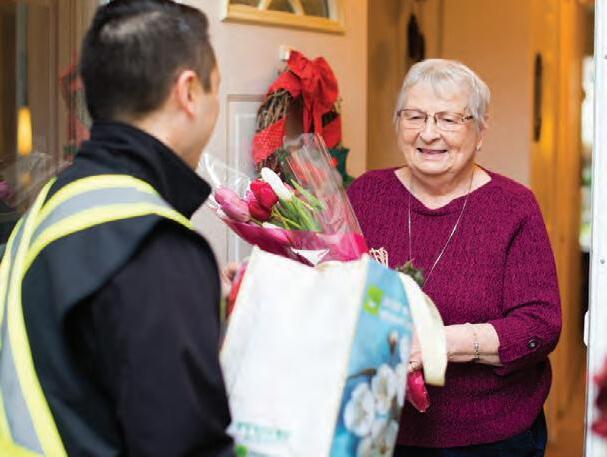

Order24hoursaday,scheduleyourpickupor deliverywhenitismostconvenientforyouand receivethesamequalityandfreshnessyou’vecome toexpectfromus.Payonline,atthestore,oratyour door. Visitthriftyfoods.comandletusdothe shoppingforyou. 2
OurSendialserviceprovidesgroceryhome deliveryforthoseunabletoshopin-storedue tomobilityorhealthissues.Ourvolunteerscall weeklytotakeyourorder,whichisshoppedand deliveredthenextdayforanominalfeeof$5. Formoreinfovisitthriftyfoods.com/sendial andletusdoyourshoppingforyou.







Chair exercises build strength and flexibility while providing support and reducing the risk of falls. While seated, lift knees alternately as if marching, engaging core and leg muscles. Stand up slowly from a sturdy chair without using your hands, then gently sit back down. This builds leg and core strength. Lift arms to the sides or front, strengthening the shoulders and upper back. Use light weights for added resistance. Tap feet and circle your ankles to improve ankle mobility and circulation, which is crucial for balance.
Improving balance and stability is critical for fall prevention. Rely on a wall or chair for support as needed. Shift your weight from side to side and front to back while holding on to support. Lift one foot slightly off the ground while holding on to a support. Alternate to the other leg. Gradually

increase the time spent balancing. Use a support to stand to help build core strength and strength in the legs.
The buoyancy of water reduces strain on joints and can help anyone with mobility issues. Walking through a pool or in a natural body of water creates gentle resistance that increases the potential of the workout. Perform controlled movements with your arms and legs through the water. Kick feet through the water while walking or when swimming.
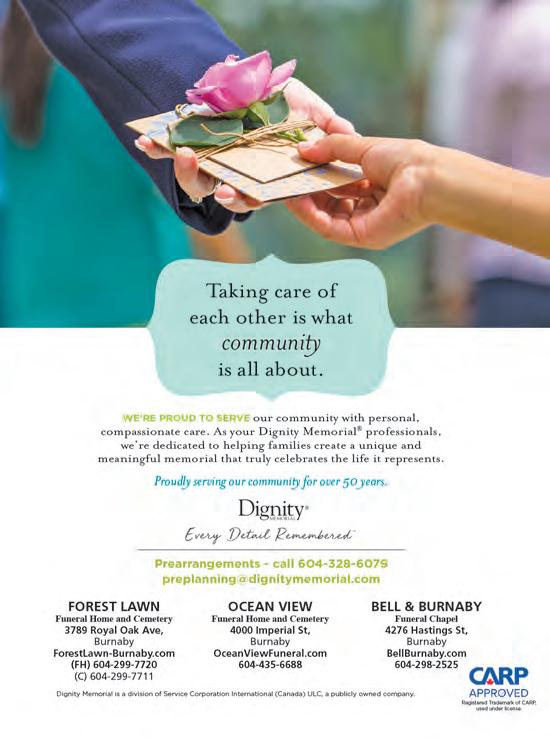
Flexibility helps anyone who is physically active. Gentle stretching, tai chi, yoga, and even working with a physical therapist can improve flexibility and mobility. Seniors with mobility issues who want to exercise should always start slowly and build up gradually. Wearing non-slip shoes is essential as well. Small, consistent efforts can make a big difference in maintaining independence and enhancing quality of life. ◆



In the world of fraud prevention and investigation, the two most used phrases are “buyer beware” and “you don’t get something for nothing.” Remember those phrases and repeat them to yourself whenever you receive any solicitation, particularly when it is by telephone. When an offer is too good to be true, it probably is. It is your responsibility to be alert, to be familiar with common frauds and scams, and to be well informed on tips that may prevent you from becoming a victim of fraud.
A scammer contacts an elderly person and pretends to be a grandchild or a family member in need of immediate financial assistance. In this typical scenario the scammer will tell the victim that they have been arrested and requires bail money, have been in a car accident, need money to cover hospital costs or are having trouble returning from a foreign country. For verification, the elderly person is given a phone number to call,

which will be answered by someone pretending to be a lawyer or a police officer.
The scammer will ask questions during the call, getting the victim to volunteer personal information. The “grandchild/family member” will insist that the victim not contact their parents or relatives as they don’t want to get into more trouble. The victim is then asked to use a money service business to send several thousands of dollars.
PREVENTION TIPS:
• Police, judges or legal entities will never request that money be sent through money service businesses.
• Confirm with other relatives the whereabouts of the family member or friend in question before even considering sending money.
• Never send money through money wire services to persons you don’t know personally. Verify the person’s identity before you take any steps to help.
There is a growing number of seniors who are turning to the internet to find love. Unfortunately, scammers know this and use every type of dating or social networking site to seek out potential victims.
The scammer will gain the trust of the victim through displays of affection and will communicate through the phone and email for months if needed to build that trust. The scammer will claim to be located in a foreign country and will always come up with an excuse to prevent face-to-face interactions. The scammer will ask for money using excuses such as not having enough money to travel to come visit or having medical expenses they can not pay.
PREVENTION TIPS:
• Don’t give out any personal information in an email or when you are chatting online with a stranger.
• Be careful communicating with someone who claims to fall in love with you quickly.
• Don’t accept any funds or send the person any money for any reasons.
• Beware of fake dating sites. Scammers will host and create fake accounts to lure potential victims.
An extortion scam is when any person unlawfully obtains money, property or services from a person, entity, or institution, through coercion. There are many variations of extortion scams but the Canada Revenue Agency (CRA) and Immigration, Refugees and Citizenship Canada (IRCC) scheme are the most prevalent ones.
Seniors are being targeted by fraudsters impersonating real government officials. Scammers are using phone calls or email to
lure people into giving personal information, passwords and financial data from individuals. For example:
• There is a notification by phone or email from the “CRA” claiming there is a refund pending. In order for the recipient to receive the refund personal information is requested.
• A notification by phone or email is received about “back taxes” owed as the result of an audit. The payment must be made immediately to avoid a fine, and in some cases, individuals are told they will be arrested or deported if the taxes aren’t paid right away.
• Government agencies won’t threaten you or ask for payment by prepaid credit card, or a money wire service such as MoneyGram or Western Union.
• Contact the real agency or company to confirm that you owe back taxes or have an unpaid balance, or are entitled to a refund.
• Ask yourself why an employee would be asking for personal information over the phone that they likely already have on file for you.
A service scam is any false, deceptive, or misleading promotion or solicitations for paid services. The two most reported service scams targeting Canadians are the antivirus software scam (Microsoft/Windows Technician) and lower interest rate scams.
The scammers involved in the antivirus software scam promise to repair your computer over the internet. This can involve the installation of software or permission to have remote access to your computer. Downloading software from an unknown source or allowing someone to remotely access your computer is risky because they may be used to capture your personal information.
The people behind lower interest rate scams often impersonate financial institutions and claim to negotiate with credit card companies to lower your interest rates. They guarantee they can save you thousands of dollars in interest. The caller will tell you that the lower interest rates are for a limited time only and that you need to act now. In addition, the scammer will request a “one time” upfront fee to process the lower interest.



















PREVENTION TIPS:
• No legitimate company will call and claim your computer is infected with a virus.
• If you are having problems with your operating system, bring it to a local technician.
• Beware of scammers advising you of an unauthorized charge on your credit card account and requesting your credit card number.
• Verify any calls with your credit card company by calling the phone number on the back of your credit card.
• Only your credit card company can lower your interest rate.
Scammers can use the Internet to promote fraud through unsolicited or junk emails, known as spam. Even if they only get a handful of replies from the millions of emails they send out, it is still worth their while. Be wary of replying, even just to “unsubscribe,” because that will give a scammer
confirmation that they have reached a real email address. Any email you receive could be spam if it comes from a sender you don’t know, isn’t specifically addressed to you, and/or promises you some benefit.
Malicious software - Scammers try to install this software on your computer so that they can gain access to files stored on your computer and other personal details and passwords.
Scammers use a wide range of tricks to get their software onto your computer. They may trick you into clicking on a link or pop-up message in a spam email, or by getting you to visit a fake website set up solely to infect people’s computers.
Phishing scams are all about tricking you into handing over your personal and banking details to scammers. The emails you receive might look and sound legitimate but genuine organizations like a bank or a government authority never request personal information by an email or online. Delete phishing emails. They can carry viruses that can infect your computer. Don’t open any attachments or follow any links in phishing emails.
Online auctions and Internet shopping
can attract scammers. Scammers will often try to get you to deal outside of online auction sites. They may claim the winner of an auction that you were bidding on has pulled out and offer the item to you. Once you have paid, you will never hear from them again and the auction site won’t be able to help you.
• Secure your computer by activating your firewall and using an anti-virus/ malware software.
• Keep your operating sysºtem current with the latest system update.
• Set your social networking profiles to private.
• Only use payment methods recommended by the Internet auction site.
The Nigerian scam (also called the 419 fraud) has been on the rise since the early-to-mid 1990s in Canada. Although many of these sorts of scams originated in Nigeria, similar scams have been started all over the world. These scams are increasingly referred to as “advance fee fraud.”
Typically, you receive an email or letter from a scammer asking your help to transfer a large amount of money overseas. You are then offered a share of the money if you agree to give them your bank account details to help with the transfer. They will then ask you to pay all kinds of taxes and fees before you can receive your “reward.” You will never be sent any of the money, and will lose the fees you paid.
Then there is the scam email that claims to be from a lawyer or bank representative advising that a longlost relative of yours has died and left you a huge inheritance. The “inheritance” is likely to be nonexistent and, as well as losing any money you might have paid to the scammer in fees and taxes, you could also risk having your identity stolen. If you are selling products or services online or through newspaper classifieds, you may be targeted by an overpayment scam. You may receive payment from a customer by cheque or money order, but the amount you receive is more than the agreed price. If you are asked to refund the excess amount by money transfer, be suspicious. The scammer is hoping that you will transfer the refund before you discover that their cheque or money order was counterfeit.









You will lose the transferred money as well as the item if you have already sent it.
PREVENTION TIPS:
• Be wary if approached by someone asking you to transfer money for them.
• Never send money, or give credit card or account details to anyone you don’t know and trust.
• Don’t accept a cheque or money order for payment for goods that is more than what you agreed upon. Send it back and ask the buyer to send you payment for the agreed amount before you deliver the goods or services.
• Don’t reply to any email that requests your personal information.
Charity scams take advantage of people’s generosity and kindness by asking for donations to a fake charity or by impersonating a real charity. Scammers are collecting money by pretending to be a real charity. ❱❱












•Door-to-DoorTransfers
•WheelchairSupport
•HospitalTransfers
•MedicalEscort
•Post-SurgeryTransfer
•RecreationalOutings
•TravelServices
•RehabTransfer
•HomeSupport
•MobilitySupport
•Companionship
•PersonalAssistance
•Housekeeping
•MealPreparation
•GroomingSupport
•OvernightCare
Weoffercustomizedservicestailoredtoeachclient’s uniqueneeds,ensuringpersonalizedcareandsupport.



The scammers can approach you in many different ways—on the street, at your home, over the phone, or on the Internet. Emails and collection boxes may even be marked with the logos of genuine charities.
Not only do these scams cost people money; they also divert much needed donations away from legitimate charities and causes. You can check for registered charities by searching in the CRA database, or contact your local Better Business Bureau to see if they have any information about the organizations that interest you. If you don’t want to donate any money, simply ignore the email or letter, hang up the phone, or say no to the person at your door. You don’t have to give any money at all.
PREVENTION TIPS:
• If you have any doubts at all about the person asking for money, don’t give them any cash, credit card or bank account details.
• Never give out your personal, credit card or online account details over the phone unless you made the call and the phone number came from a trusted source.
• If in doubt, approach an aid organization directly to make a donation or offer support.
In lottery or sweepstake scams, seniors are solicited over the phone or email and advised that they are the winner. Prior to receiving any winnings, they are told they must first pay an upfront fee or provide personal information. No winnings are ever received. You can’t win money or a prize in a lottery unless you have entered it yourself, or someone else has entered it on your behalf. You shouldn’t have to pay any fee or tax to claim a legitimate prize.
A fake prize scam will tell you that you have won a prize or a contest. You may receive a phone call, an email, a text message or see a pop-up screen on your computer. The scammers make their money by making you pay fees or taxes, call their premium rate phone numbers or send premium text messages to claim your prize. These premium rate calls can be very expensive, and the scammers will try to keep you on the line for a long time or ask you to call a different premium rate number.

• Legitimate lotteries don’t require you to pay a fee or tax to collect a winning.
• Never send money, or give credit card or account details to anyone you don’t know and trust.
• Examine all of the terms and conditions of any offer very carefully—claims of free or very cheap offers often have hidden costs. Calls to premium rate phone numbers or premium text messages can be very expensive.
• You can’t win money or a prize in a contest unless you have entered it yourself, or someone else has entered it on your behalf.
Any false, deceptive, misleading or fraudulent investment opportunity, often offering higher than normal true monetary returns.
In a typical pyramid scheme, unsuspecting investors are encouraged to pay large membership fees to participate in money-making ventures. The only way for you to ever recover any money is to convince other people to join and to part with their money as well. People are often persuaded to join by family members or friends. But there is no guarantee that you will recoup your initial investment.
Although pyramid schemes are often
cleverly disguised, they make money by recruiting people rather than by selling a legitimate product or providing a service. Pyramid schemes inevitably collapse and you will lose your money. In Canada, it is a crime to promote a pyramid scheme or even to participate in one.
Ponzi schemes are fraudulent investment operations that work in a similar way to pyramid schemes. The Ponzi scheme usually entices investors by offering abnormally high, short-term returns that are unusually consistent. The schemer usually interacts with all the investors directly, often persuading most of the existing participants to reinvest their money, thereby minimizing the need to bring in new participants.
PREVENTION TIPS:
• Pyramid and Ponzi schemes may be sent to you from family members and people you trust. They might not know they’re involved in an illegal scam.
• Be wary of fraudsters requesting large wire transfers to foreign countries for an offshore investment.
• Never commit to anything at highpressure meetings or seminars.
• Be wary of fraudsters promising an investment opportunity with a higher than normal return.
• Be an informed investor and check with you provincial securities regulator. ❱❱


Ourteamofnotariesandsupportstaffisdedicatedto providingyouwiththebestservicepossible. We understandtheimportanceofyourlegal documentsandwetakegreatcaretoensurethatthey arehandledwiththeutmostcareandattentionto detail.Letushelpyouwithallyournotaryneeds!

•RealEstateTransfers
•Mortgages
•Wills
•PowerofAttorney
•Declarations




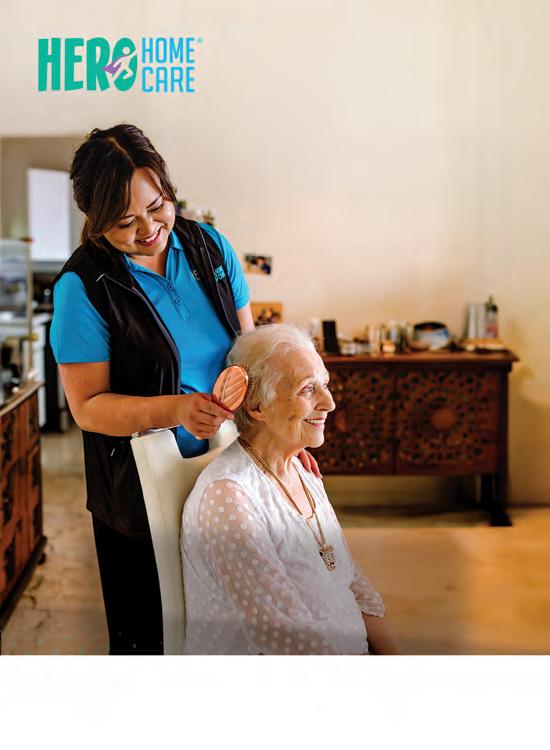

Miracle cure scams offer a range of products and services that can appear to be legitimate alternative medicines, usually promising quick and effective remedies for serious medical conditions. The treatments claim to be effective against a very wide range of ailments and are often promoted using testimonials from people who have used the product or service and have been “cured.”
Weight loss scams promise dramatic weight loss with little or no effort. The products are promoted with the use of false claims such as “lose 10 kilos in 10 days” or “lose weight while you sleep,” and often require large advance payments or that you enter into a long-term contract to participate in the program.
Fake online pharmacies use the Internet and spam emails to offer drugs and medicine at very cheap prices and/or without the need for a prescription from a doctor. If you use such a service, there is no guarantee that you will receive the medication or that the medication is real. There are legitimate online pharmacies but they will require a valid prescription before they send out any medicine that requires one.
PREVENTION TIPS:
• There are no magic pills, miracle cures or safe options for serious medical conditions or rapid weight loss.
• Don’t trust an unsubstantiated claim about medicines, supplements or
other treatments. Consult your healthcare professional.
• Check for published medical and research papers to verify the accuracy of the claims made by the promoters.
Identity crimes have become an increasingly popular crime as a result of continuous advances in technology. Identity thieves are stealing, misrepresenting or hijacking the identity of another person or business which provide them effective means to commit other crimes.
Vital information such as name, address, date of birth, social insurance number, and mother’s maiden name need to be acquired in order to complete the impersonation. Identity thieves can take over the victim’s financial accounts, open new bank accounts, transfer bank balances, apply for loans, and so on. The true owner may be liable for these activities.
PREVENTION TIPS:
• Only give out personal details and information where it is absolutely necessary and when you trust the person you are speaking to or dealing with.
• Destroy personal information: You should cut up or shred old bills, statements or cards.
• Treat your personal details like you would treat money: don’t leave them lying around for others to take.
• Immediately report lost or stolen credit cards and any discrepancies in your monthly statements.

One relatively new scam to be aware of involves bank cards and credit cards. Typically, fraudsters posing as banks call individuals and advise them to cut up their banking and credit cards. The fraudsters then send someone to their house to pick up the destroyed cards, claiming that it is for security purposes. These scammers are able to access bank accounts and purchase items with the destroyed cards, often before the individual is able to cancel their accounts. Please be cautious when speaking to anyone posing as your bank on the phone, and remember that your bank will never send someone to collect your bank card.
More seniors than ever are using mobile phones—and unfortunately, fraudsters know it. Text message scams often look like messages from a government agency or utility company offering refunds or demanding urgent action. These scammers may even fake caller ID to make it seem more believable. Never click on links in unexpected texts, and don’t respond to messages from unknown numbers. When in doubt, contact the company directly using a trusted number—your caution could stop a scam in its tracks.
Even though many of us have heard of CRA scams, they continue to be a common trap. Fraudsters may call, email, or text pretending to be from the Canada Revenue Agency, often using pressure tactics or threats of arrest. The CRA will never ask for payment in gift cards, crypto, or by text. If you’re unsure, hang up and call the CRA directly using their official number. And remember, there’s no shame in being targeted—reach out for support if it happens to you.
ChatGPT is a free and helpful tool for everyday tasks like writing letters, finding recipes, or exploring new ideas. However, it is not always accurate and should never replace professional advice. Think of it like a public noticeboard—anything you type could potentially be seen by others. That’s why it’s essential to avoid entering personal details like your SIN, home address, or banking information. Stay safe by keeping your questions general and never sharing sensitive data. ◆






























BY BEN BENGTSON
rom a career spent undertaking big projects to smaller but equally as important tasks later on such as assembler of tables or repairer of broken pot handles, Allan Phillips knows his way—to say the least—around a workbench. And crucially, he knows how to manage

and teach others to do the same thing. For the past 25 years, Phillips has spent his golden years as the activity group leader of woodworking at Coquitlam’s Dogwood Pavilion Seniors’ Society, a role he says has kept him active, on the move, and looking forward. ❱❱





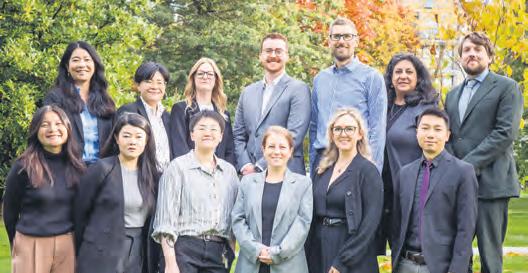











“I’m 95—and still mobile,” notes Phillips. “Trying to help people in my life has made all the difference.”
Born in Saskatchewan but a B.C. transplant by six months old, Phillips recalls learning his way around buzzsaws and belt sanders as a teenager by way of his father’s fix-itall approach. “We fixed everything ourselves,” he remembers.
As an adult, Phillips plied his own handy skills toward a vocation as a professional plumber, which eventually led to him working in industry where he oversaw teams around the world building everything from power generators to pulp mills. Fast-forward to his retirement years and Phillips’ voice rises with enthusiasm when talking about the smaller scale but essential woodshop work he has overseen at Dogwood going on three decades. “It’s like a home away from home,” he says.
As the group leader of woodworking, it’s Phillips’ job to oversee a well-
“THE FACT THAT THEY HAVE A SMILE ON THEIR FACE AND THEY’RE HAPPY WITH THE JOB—THERE’S A LOT OF SATISFACTION THERE.”
ALLAN PHILLIPS
Operated by the City of Coquitlam, Dogwood Pavilion is a recreation centre for older adults and seniors which offers everything from a library and snooker room to a lapidary workshop and, of course, a woodworking shop.
stocked and functional woodshop. “You try to make sure that all the machinery is working right and that guys are working safe; you have to go and buy a lot of different things that people need like drills bits, screw drivers, glue, sandpaper,” he says. “We do a lot of repair work for people—we fix chairs or broken drawers, and we make a lot of card holders and charcuterie boards.”
While he continues to manage the shop, Phillips admits his health has been less than stellar recently. Still, he maintains his immense satisfaction with his role and desire to keep on doing it for as long as possible. “It’s a busy place,” he says, in reference to the thousands of volunteer and workshop hours that go into the shop and its mandate to repair items for Dogwood users. “The fact that they have a smile on their face and they’re happy with the job—there’s a lot of satisfaction there.”
But the biggest satisfaction is all Phillips’. Indeed, let the record note that Phillips initially has to cut this phone interview short: there was more work in the shop that needed doing. “I bought a new battery for one of the sanders,” he says, “so I had to deliver that as well.” ◆
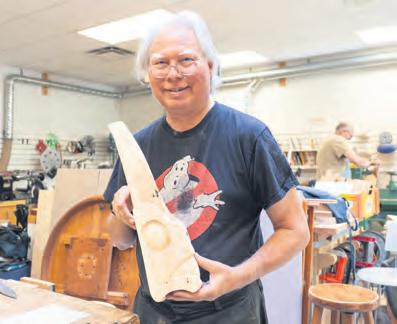
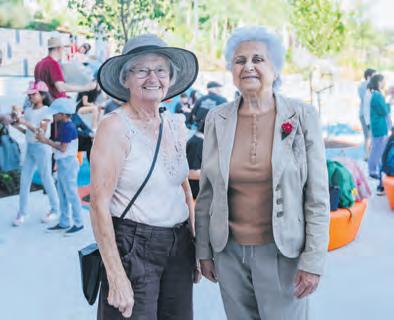


















Proudlyserving multiplegenerationsof clientsinthe Tri-Cities areasince1974. Thankyoufor recognizingusasone ofyourtoplawfirms!



Garton &Harrisisa service-orientedlawfirm.Ourlawyersandstaff havea simpleobjective: toprovideaccessibleandaffordablelegalservicesfortheeverydayneedsofbusinessesand individuals. We havebeentrustedforover40yearsbyclientsinPortCoquitlamandthe Tri-Citiesarea. Ifyouhaveanyquestionsconcerningpropertytransfers,mortgages,debtcollections, wills,estatesandprobate(uncontestedorcontested)powersofattorney,representation agreements,familylaw, oranyothermatteronwhichyouthinktheassistanceof alawyermay behelpful,pleasefeelfreetocontactusfor afreeinitialconsultation.




Medications are necessary to manage health conditions, improve quality of life and prevent illnesses. Recent data from Statistics Canada shows that by 2021, 81% of seniors aged 60-79 had used at least one prescription medication in the past month, while 52% were using three or more.
It is essential to manage medications properly to avoid serious health risks. Medications can interact with one another and cause adverse drug
reactions when paired with over-thecounter products and even certain foods and beverages.
Drugs.com reports drug interactions are a major cause of hospitalizations and side effects. A 2024 study published in Scientific Reports found that 5 percent of hospitalizations among patients age 65 and older (78 being the median patient age) were caused by side effects associated with polypharmacy (multiple medication use). This underscores the importance of


Mealpreparation
Safetysupervision
Companionship
Familyrespitecare
Transportationtoappointmentsanderrands

Assistancewithpersonalcare/lighthousekeeping
Empoweringneurodiversechildren
•
Specializedcareprograms
•












The first step in safe medication use is to be fully vetted about every medication taken. This includes the brand and generic name, dosage, frequency of dosage, timing of taking the drug, how it should be administered, side effects, storage, and interactions. It is important to keep an updated list of all medications taken, including vitamins, supplements and OTC drugs to share with each health care provider at every appointment.
Strictly adhere to the information on the medication label and any instructions provided by the doctor or nurse. Never alter dosage volume or frequency without first consulting a health care provider. Complete a full course of antibiotics even after symptoms improve to prevent antibiotic resistance. Do not share medications with others or take someone else’s prescriptions.
Open a dialogue with health care providers to get further clarification about medications and questions that come up. Report side effects promptly and inquire about alternative medications that may be available. Also communicate if the cost of a specific drug is prohibitive, as failing to take a medication due to cost can be a health risk.
Utilize an effective system for storing and organizing medications to

prevent missed or accidental double doses. Use reminders on smartphones or health trackers to remember when to take medication doses. Always store drugs in their original containers, away from children and pets. Safely discard old medications when the expiration date has passed. To safely dispose of unwanted medications in B.C., return them to a participating pharmacy through the BC Medications Return Program (MRP). ◆





















MARK YOUR CALENDARS!
The Fall Seniors Expo is happening on Tuesday, October 15th from 10 AM – 2 PM at the Scandinavian Community Centre in Burnaby.
This free community event brings together over 20 vendors offering helpful resources, services, and information tailored to seniors and their families. Whether you’re looking to learn about healthy aging, local services, or simply want to connect with your community, there’s something here for everyone.
Enjoy free admission, free parking, and free coffee, plus the chance to win great door prizes throughout the day. Even if you just stop by for a cup of coffee, we’d love to see you!
To help us plan, please take a moment to register in advance:

We look forward to welcoming you to a day of learning, connection, and fun!






Youarenotreadytoleaveyourhome, butyoudoneedhelptostaythere safely.Shylohashelpedseniorslive intheirhomescomfortablysince1980 byoffering awiderangeofservices thatmakedealingwitheverydaylife just
